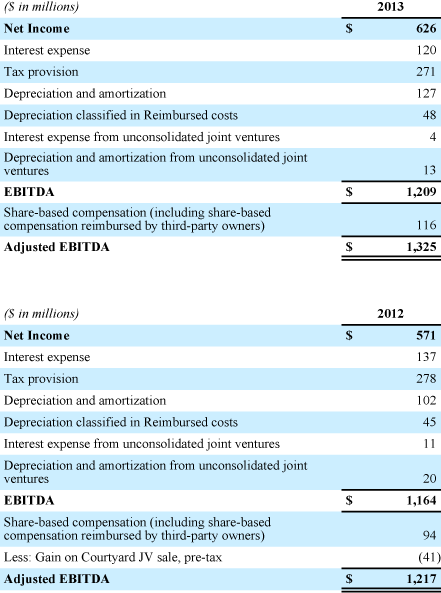 Financial Information
Financial Information
Earnings Before Interest Expense, Taxes, Depreciation and Amortization (“EBITDA”) and Adjusted EBITDA
EBITDA, a financial measure that is not prescribed or authorized by United States generally accepted accounting principles (“GAAP”), reflects earnings excluding the impact of interest expense, provision for income taxes, depreciation and amortization. We believe that EBITDA is a meaningful indicator of operating performance because we use it to measure our ability to service debt, fund capital expenditures, and expand our business. We also use EBITDA, as do analysts, lenders, investors and others, to evaluate companies because it excludes certain items that can vary widely across different industries or among companies within the same industry. For example, interest expense can be dependent on a company’s capital structure, debt levels, and credit ratings. Accordingly, the impact of interest expense on earnings can vary significantly among companies. The tax positions of companies can also vary because of their differing abilities to take advantage of tax benefits and because of the tax policies of the jurisdictions in which they operate. As a result, effective tax rates and provision for income taxes can vary considerably among companies. EBITDA also excludes depreciation and amortization because companies utilize productive assets of different ages and use different methods of both acquiring and depreciating productive assets. These differences can result in considerable variability in the relative costs of productive assets and the depreciation and amortization expense among companies. We, therefore, exclude depreciation and amortization expense. Effective with this report, we have also modified our EBITDA calculation to exclude depreciation and amortization expense that we classify in the “Owned, leased, and corporate housing-direct expenses” and “General, administrative, and other expenses” captions of our Income Statements; as well as the depreciation expense that third party owners reimburse to us that we classify in the “Reimbursed costs” caption of our Income Statements.
We also believe that Adjusted EBITDA, another non-GAAP financial measure, is a meaningful indicator of operating performance. Our Adjusted EBITDA reflects: (1) an adjustment to exclude the $41 million pre-tax gain on the 2012 sale of an equity interest in a North American Limited-Service joint venture discussed earlier in the “Gains and Other Income” caption; and (2) beginning with this report, an adjustment to exclude share-based compensation expense for all years presented. Because companies use share-based payment awards differently, both in the type and quantity of awards granted, we excluded share-based compensation expense to address considerable variability among companies in recording compensation expense. We believe Adjusted EBITDA that excludes these items is a meaningful measure of our operating performance because it permits period-over-period comparisons of our ongoing core operations before these items and facilitates our comparison of results before these items with results from other lodging companies.
EBITDA and Adjusted EBITDA have limitations and should not be considered in isolation or as substitutes for performance measures calculated under GAAP. Both of these non-GAAP measures exclude certain cash expenses that we are obligated to make. In addition, other companies in our industry may calculate EBITDA and in particular Adjusted EBITDA differently than we do or may not calculate them at all, limiting EBITDA’s and Adjusted EBITDA’s usefulness as comparative measures.
We show our 2013 and 2012 EBITDA and Adjusted EBITDA calculations that reflect the changes we describe above and reconcile those measures with Net Income in the following tables:

